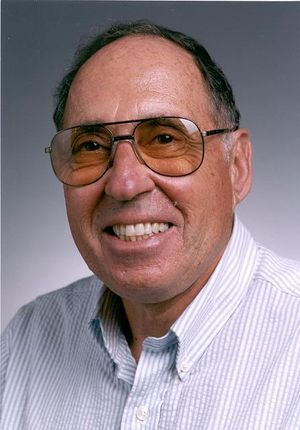Jack Wolf: Difference between revisions
No edit summary |
No edit summary |
||
| Line 11: | Line 11: | ||
Early in his career, Dr. Wolf established himself as a major innovator in the fields of information and coding theory through contributions such as 1973's Slepian-Wolf theory for correlated information sources. In 1984, he left his faculty position at the University of Massachusetts in Amherst to join the Center for Magnetic Recording Research at the University of California in San Diego. By applying his knowledge of communication and information theory to the magnetic recording industry, he pioneered the field of coding for the magnetic recording channel. His biggest theoretical contribution was to design code with performance that was boosted by channel memory, rather than hindered by it. Now the Stephen O. Rice Professor in the Department of Electrical and Computer Engineering, Dr. Wolf has also held a part-time appointment at QUALCOMM, Inc. in San Diego, California, since its formation in 1985. | Early in his career, Dr. Wolf established himself as a major innovator in the fields of information and coding theory through contributions such as 1973's Slepian-Wolf theory for correlated information sources. In 1984, he left his faculty position at the University of Massachusetts in Amherst to join the Center for Magnetic Recording Research at the University of California in San Diego. By applying his knowledge of communication and information theory to the magnetic recording industry, he pioneered the field of coding for the magnetic recording channel. His biggest theoretical contribution was to design code with performance that was boosted by channel memory, rather than hindered by it. Now the Stephen O. Rice Professor in the Department of Electrical and Computer Engineering, Dr. Wolf has also held a part-time appointment at QUALCOMM, Inc. in San Diego, California, since its formation in 1985. | ||
An [[IEEE Fellow Grade History|IEEE Life Fellow]], Dr. Wolf served as president of the IEEE Information Theory Society in 1974. He also is a Fellow of the American Association for the Advancement of Science, a member of the U.S. National Academy of Engineering and a Guggenheim Fellow. | An [[IEEE Fellow Grade History|IEEE Life Fellow]], Dr. Wolf served as president of the [[IEEE Information Theory Society History|IEEE Information Theory Society]] in 1974. He also is a Fellow of the American Association for the Advancement of Science, a member of the U.S. National Academy of Engineering and a Guggenheim Fellow. | ||
[[Category:Information_theory]] | [[Category:Information_theory]] | ||
[[Category:Codes]] | [[Category:Codes]] | ||
Revision as of 17:46, 24 May 2011
Jack Wolf
Born: March 14, 1935
Died: May 12, 2011
Over the past four decades, Dr. Jack Keil Wolf has been a driving force in the evolution of information, coding and communication theories. He remains one of the most productive cross-fertilizers in engineering research, successfully importing techniques used in one field to obtain unexpected results in another. Among his and his students' achievements are contributions to the design and analysis of satellite and cellular communication systems, and hard disk drives.
Early in his career, Dr. Wolf established himself as a major innovator in the fields of information and coding theory through contributions such as 1973's Slepian-Wolf theory for correlated information sources. In 1984, he left his faculty position at the University of Massachusetts in Amherst to join the Center for Magnetic Recording Research at the University of California in San Diego. By applying his knowledge of communication and information theory to the magnetic recording industry, he pioneered the field of coding for the magnetic recording channel. His biggest theoretical contribution was to design code with performance that was boosted by channel memory, rather than hindered by it. Now the Stephen O. Rice Professor in the Department of Electrical and Computer Engineering, Dr. Wolf has also held a part-time appointment at QUALCOMM, Inc. in San Diego, California, since its formation in 1985.
An IEEE Life Fellow, Dr. Wolf served as president of the IEEE Information Theory Society in 1974. He also is a Fellow of the American Association for the Advancement of Science, a member of the U.S. National Academy of Engineering and a Guggenheim Fellow.
